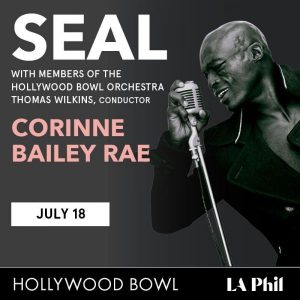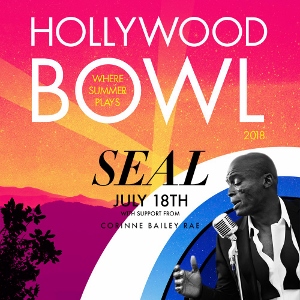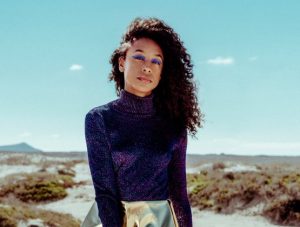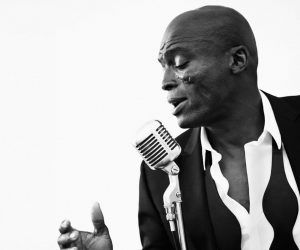HIS STANDARDS SEAL THE DEAL
I was stunned at how many Bowl patrons were arriving during Corinne Bailey Rae’s set at the Hollywood Bowl last Wednesday. I get that Seal was the main attraction, but this soulstress — with her enchanting and seductive vocal whirls — has proved herself to be one of the most gifted chanteuses on the music scene today. For her return to the Bowl (she appeared at the 2017 Playboy Jazz Festival), she showed how she continually reinvents herself, going from her typically jazzy sonic palette to more rollicking rhythms, buffeted by her customary acoustic guitar stylings, and aided by a tight but way over-miked band: Steve Brown (keys), John McCallum (guitar), Mark Walker (bass), and Myke Wilson (drums). I know volume needs enhancing at the Bowl, but even if you were familiar with her albums, lyrics were tough to hear over the thump.
Representing her latest output, The Love EP, she offered one of the five covers from that album: Bob Marley & The Wailers’ “Is This Love?” Her slowed-down Southern-style, gospel-tinged makeover of this 1978 hit had patrons grooving in their seats. Affable and gracious – sometimes locking her hands together over her head — Ms. Rae looked splendid with her generous shoulder-length copse of dark corkscrew ringlet hair.
Two songs from her 2006 eponymous debut (which reached No. 1 in her homeland, the UK) were welcome additions: It’s clear why “Put Your Records On” and “Like a Star” attracted both millennials and their folks; she put jazz-influenced soul-pop into the mainstream, selling over four million copies.
Her first of seven songs in this under-forty-minute set was “Been to the Moon,” which had her skillfully playing with the traditional stylings of Billie Holiday while tinting the tune with a contemporary soul feel. Bailey was wholly in her element, enthusiastically navigating this surefire touchstone from The Heart Speaks in Whispers. Also from that popular 2016 CD was the set-ender, “The Skies Will Break,” which had her lithe, supple vocals effortlessly adapt to the alternate instrumentation and pounding disco beat, a great lead-in to Sir Seal.
If they were talkative during Corinne Bailey Rae, the audience of about 12,000 was completely rapt and focused for Seal’s take on songs from the Great American Songbook taken from his new CD, Standards, recorded down the street at Capital Records. The indefatigable 55-year-old strolled onto the stage like a cool member of the Rat Pack wearing an open-collar black suit with neon-red shoes, completely pulling us in with a red-hot arrangement of Loesser’s “Luck Be a Lady” from Guys and Dolls.
Maestro Thomas Wilkins took on the charts as if he wrote them himself leading members of the Hollywood Bowl Orchestra, those studio musicians who can do no wrong. With horns soaring over the big band brass, German-born Chris Walden’s arrangements sounded a lot like Nelson Riddle’s for Frank Sinatra, but I had to look up the orchestrator because, unlike Frank, Seal never mentioned a composer or arranger once.
But Seal, who quickly became a name in 1990 with the number one hit single “Killer” is clearly not out to reinvent the genre for his tenth studio album. I had two favorite covers that did stretch convention: The first a soulful tribute to the Nina Simone version of Screamin’ Jay Hawkins’ 1956 “I Put a Spell on You”: we got a little funk, a little blues, a little scat, a little folk, a little soul and 150% of Seal’s soaring charisma.
The other was Ervin Drake’s 1961 “It Was a Very Good Year,” which numerous singers have recorded since it was made famous by Sinatra in 1966. Seal’s rendition, while it does smack of Gordon Jenkins’ arrangement, was wistful, heartfelt, and – given his hoarse, raspy quality – truly sounded like it came from a man at the end of his years. You could have heard a pin drop at the Bowl – and that’s quite an accomplishment.
With a black drape of fiber optic color-changing stars behind him, we got a bouncy “They Can’t Take That Away from Me,” a pleasingly different contemporary big band affair with Cole Porter’s “I’ve Got You Under My Skin,” and the way over-covered Rodgers & Hart classic, “My Funny Valentine.” Seal worked the crowd walking around the ramp in front of the pool area, crooning directly to giddy admirers.
In a tribute to Sinatra, we got a tune not on the Standards CD: Dean Kay and Kelly Gordon’s “That’s Life” — hushed but physically swaying, the crowd just ate it up. But then something interesting happened: After the standards, which I thought would take up the entire 75-minute set, and the orchestra members departed, leaving Seal’s band to back him up on his earlier pop, soul and dance tunes, patrons began talking and partying. And since it was “Jazz Night at the Bowl” I assume that those who began departing early were craving the big band sound, and didn’t find the other tunes, however fun, to their liking.
 Seal first paid homage to the great Joni Mitchell, who was in attendance, by singing just two lines from “Big Yellow Taxi,” which Seal had covered before. If she was his greatest influence, why not the whole song or something completely different from her vast catalog?
Seal first paid homage to the great Joni Mitchell, who was in attendance, by singing just two lines from “Big Yellow Taxi,” which Seal had covered before. If she was his greatest influence, why not the whole song or something completely different from her vast catalog?
He played his acoustic guitar for “Kiss from a Rose,” gyrated up a storm on “Killer,” wailed beautifully on “Prayer For the Dying,” and got us grooving with his cover of Steve Miller Band’s “Fly Like an Eagle.” For Curtis Mayfield’s “Move on Up,” he brought on the 26-year-old breakout singer, Gallant, who did nothing more than background singing. Why wasn’t this millennial even given one verse? And why wasn’t he properly introduced so that everyone knew who he was? Was it due to time constrictions? Seal said at least five times that The Bowl had a curfew, so’¦
For the immediate encore, he brought on his eight-year-old daughter, who played the popular riff of Stevie Wonder’s “Superstition” on piano, followed by Bowie’s “Rebel Rebel” and one of his few non-covers of the night, “Crazy,” (written with Guy Sigsworth). While the latter half of the act was 90s’ nostalgia cubed, it’s clear the standards were the viewers’ favorite songs.
photos courtesy of LA Phil
Seal and Corinne Bailey Rae
played Wednesday, July 18, 2018
for more info, visit Hollywood Bowl




